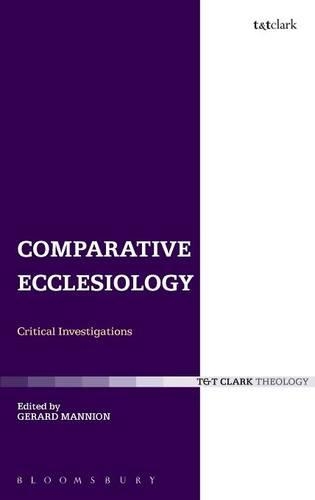
Comparative Ecclesiology: Critical Investigations
(Hardback)
Publishing Details
Comparative Ecclesiology: Critical Investigations
By (Author) Dr Gerard Mannion
Bloomsbury Publishing PLC
T.& T.Clark Ltd
13th June 2008
United Kingdom
Classifications
Tertiary Education
Non Fiction
Theology
262
Physical Properties
Hardback
240
Width 156mm, Height 234mm
503g
Description
This volume will explore issues such as the nature, method and development of comparative ecclesiology; critical assessments as well as appreciations of Roger Haight's Christian Community in History. The Jesuit, Roger Haight, has written extensively in the fields of systematic theology, liberation theology, Christology and, of course, ecclesiology itself. He champions the need for the church to embrace a dialogical mission. This represents his most extensive work to date in ecclesiology and is a monumental volume study in comparative ecclesiology, volume 3 coming in 2008, building upon the insights developed in recent years in the more general sub-discipline of comparative theology.
In all, Haight's pioneering work in this emerging field of comparative ecclesiology encourages us to immerse our contemporary explorations in, first, historical consciousness, thereby inculcating the disposition of humility - both in methodological terms and, when one realises how far short we fall of some of our ecclesial forebears, in terms of ecclesial life and practice as well. Second, as indicated, he commends the positive appreciation of pluralism. Third, a whole-part conception of church, neither placing universal over and above local nor vice-versa. Four, we should be attentive to embracing the gifts and human challenges of religious pluralism. And, of course, five, Haight reassures those fearful that such undertaking might entail any loss for the churches: he reminds us how such ecclesiological encounters are and should be undertaken from within a particular confessional or ecclesial identity.
We have assembled a range of noted ecclesiological scholars to discuss not simply Professor Haight's work, but also to engage with the issues he raises in a wider context, such as the respective methodological debates surrounding ecclesiology from above' and from below', to the nature and promise of comparative ecclesiology in itself, to the prospects for a pluralistic ecclesiology' in the world today, and the challenges such an undertaking presents to the Christian churches. Roger Haight will be invited to offer his own reflections upon the various chapters.
Reviews
Mention -Book News, November 2008
'The book is a courageous and laudable effort by a select group of ecclesiologists to explore and to analyze Roger Haight's Christian Community in History, whose third volume appeared practically simultaneously to the book under review. Comparative Ecclesiology is indeed a thought-provoking work on the church/es at the threshold of thetwenty-first century. The scholars do not simply limit themselves to discuss Haight's work, but elaborate certain themes which he raises.' Hector Scerri -- Hector Scerri * Ecumenical Review, The *
'The book is divided into three parts. Part 1, "Method," explores ecclesiological method especially in relation to Haight's historical, "from below" approach. Part 2, "Questions of Communion and Wider Application," takes up the comparative method developed in Haight's second volume and explores its implications for relations among Christians and between Christians and members of other world religions. Part 3, "Prospects and Promise," looks to the future and the potential of the comparative approach.' Michael Attridge, University of Saint Michael's College, Toronto -- Micahel Attridge * Theological Studies *
Author Bio
'Gerard Mannion is the Amaturo Professor in Catholic Studies at Georgetown University, Washington, DC, where he is also a Senior Research Fellow of the Berkley Center for Religion, Peace and World Affairs. He serves as chair of the Ecclesiological Investigations International Research Network (www.ei-research.net) and is editor of the Bloomsbury Series, Ecclesiological Investigations'
